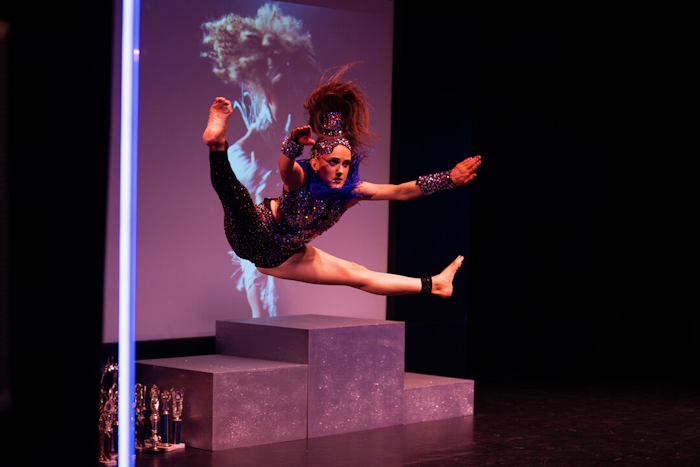The Place, London
September 17, 2025
Ella Tighe’s Disco Queen is a strange, slightly off-beat, performance. Set in a freestyle dance competition, somewhere in the north of England, it delves into the world of disco freestyle dance. In doing so, the pieces moves between autobiographical monologue and commentary on freestyle competitions and competitors, with a little self-indulgent reflection on what was the point of the whole freestyle dance scene added for good measure. Tighe was a disco freestyle dancer as a child before training in contemporary dance from age 18.
According to the programme notes, disco freestyle dance was born out of the film Saturday Night Fever, although it can equally be argued that the film simply reflected what was happening anyway.
However, what Tighe presents is nothing like the dancing in the movie, although she does acknowledge that freestyle has changed over the intervening four decades, and has become very athletic and fierce.
Tighe presents an hour of monologue, interspersed with freestyle dance routines. The routines are very short, for competitions usually 30-40 seconds long. They are very energetic, involving many moves that do seem more gymnastic than dance. But being so short, it is difficult to make much connection between them. Disco Queen does feel like watching a set of skills put together for a competition, rather than an actual single dance work.
Costumes are integral to freestyle. They’re usually sone or two-piece, sequinned, skimpy, and body hugging. Most bodies do not look their best in such costumes, and when fake tan and a great deal of make-up is added, the combined effect is unfortunately more akin to a drag-show. To be fair, Tighe does say this narrative does need to change and more respect given to the dance form itself, but making that change is largely in the dancers’ own hands.
A highlight of Disco Queen is the original soundtrack, composed by Ed Heaton, with lyrics by Heaton and Tighe.
The show ended with a short presentation of freestyle by Generation Next, which featured some very young dancers indeed. As impressive as they were, I couldn’t help thinking that they would have looked ever greater in jeans and a T-shirt, and their considerable skills showcased to much better effect than through fake tan, make-up and skimpy sequined bikinis.
Tighe’s closing reflection was what had all those years of giving up so much else in order to be able to do freestyle competitions every weekend been for. I left the theatre feeling very similar about the 75 minutes I had just sat through.

